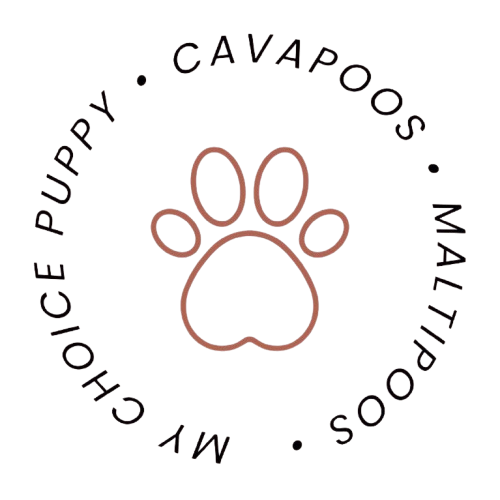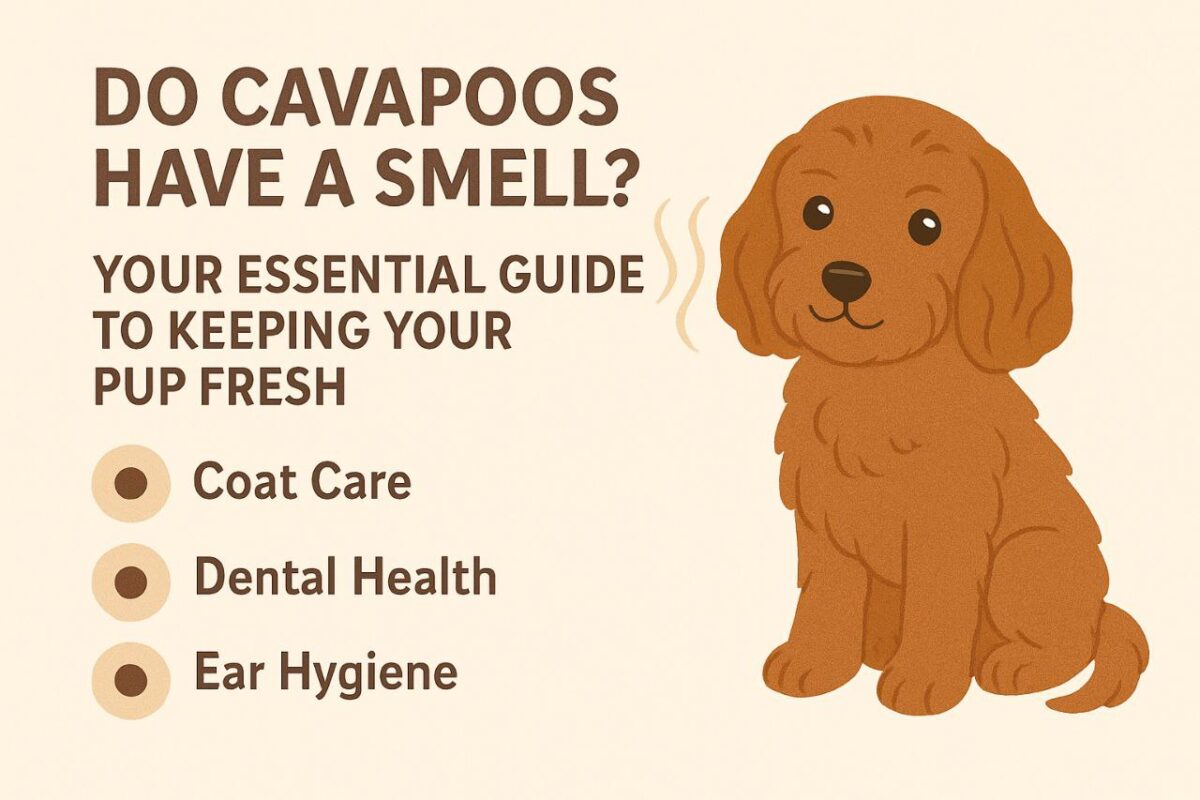Blog, CAVAPOO BLOG
Do Cavapoos Have a Smell? Your Essential Guide to Keeping Your Pup Fresh
Introduction: Addressing the Question, Do Cavapoos Have a Smell?
Cavapoos, the enchanting cross between the affectionate Cavalier King Charles Spaniel and the intelligent Miniature or Toy Poodle, are cherished worldwide for their fluffy coats, soulful eyes, and loving demeanor. These petite companions thrive in diverse settings, from vibrant city apartments in Singapore to tranquil countryside homes in Tuscany, captivating owners with their playful spirit and adaptability.
Yet, a common question echoes among prospective and current owners: “Do Cavapoos have a smell?” This comprehensive guide dives into the factors influencing a Cavapoo’s odor, from grooming practices to health conditions, providing practical solutions to ensure your pup remains fresh and odor-free. Whether you’re considering welcoming a Cavapoo into your life or seeking to maintain a clean-smelling companion, this article answers “Do Cavapoos have a smell?” with expert insights and actionable care tips.
The perception that dogs carry a distinct “doggy smell” doesn’t always apply to Cavapoos, thanks to their low-shedding, often hypoallergenic coats. However, without proper care, odors can develop, prompting owners to wonder, “Do Cavapoos have a smell?” This guide explores the root causes of potential odors—natural oils, health issues, or environmental factors—and offers a roadmap to keep your Cavapoo as fresh as a spring morning. Drawing on veterinary expertise, global owner experiences, and grooming best practices, we aim to empower Cavapoo enthusiasts everywhere to foster a delightful, odor-free companionship, whether in a bustling metropolis like São Paulo or a serene village in New Zealand.
The Cavapoo Breed: Coat and Characteristics
To answer “Do Cavapoos have a smell?”, understanding the Cavapoo’s unique traits, particularly their coat, is essential, as it significantly influences odor development. Cavapoos are a designer hybrid, bred to blend the Cavalier’s warm sociability with the Poodle’s intelligence and low-shedding fur. Weighing 10–20 pounds and standing 12–15 inches tall, they boast a wavy-to-curly coat that ranges from silky to dense, appearing in shades like apricot, cream, black, or tri-color. This low-shedding coat, a hallmark of their Poodle heritage, reduces dander and loose hair that can trap odors, unlike high-shedding breeds such as Golden Retrievers. However, the question “Do Cavapoos have a smell?” often arises because their coat requires diligent maintenance to stay odor-free.
The Cavapoo’s coat produces natural oils to maintain its health, but these can accumulate, leading to a subtle musky scent if not managed. Environmental factors, such as romping through a muddy park in London or brushing against dusty trails in Cape Town, can introduce dirt or moisture that clings to their fur, fostering odors if left unchecked. Unlike breeds with oily coats, like Basset Hounds, Cavapoos don’t naturally exude a strong smell, but neglecting grooming can change that. Their small size and floppy ears also make them prone to specific odor-causing issues, like ear infections, which we’ll explore later. By grasping the nuances of their coat, owners can address the question “Do Cavapoos have a smell?” with targeted care, ensuring their pup remains a fresh, cuddly companion.
Why Might Cavapoos Develop a Smell?
Several factors contribute to whether Cavapoos have a smell, ranging from grooming habits to underlying health conditions, each requiring specific attention to keep odors at bay. When owners ask, “Do Cavapoos have a smell?”, grooming often emerges as a primary concern. Their wavy-to-curly coat, while low-shedding, traps dirt, debris, or moisture if not brushed regularly, creating a breeding ground for bacteria or yeast that produces a musty odor.
This is particularly noticeable in areas prone to matting, like the ears or underbelly, where trapped moisture can lead to a smell that prompts the question, “Do Cavapoos have a smell?” Infrequent bathing—less than every 4–6 weeks—or using inappropriate shampoos can exacerbate this, as oils and dirt accumulate. Over-bathing, however, strips natural oils, causing dry, irritated skin that may emit an unpleasant scent, a challenge for owners in diverse climates from humid Hong Kong to arid Dubai.
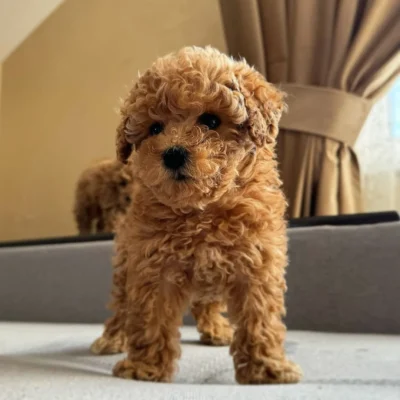
Health issues are another key factor when exploring “Do Cavapoos have a smell?” Dental disease, common in small breeds due to crowded teeth, leads to bad breath, often mistaken for a body odor. Plaque and bacterial buildup cause gingivitis or infections, emitting a foul smell that daily brushing or veterinary cleanings can address. Skin allergies or infections, triggered by environmental allergens like pollen or food sensitivities, produce a yeasty or rancid odor, accompanied by itching or redness.
Owners may notice their Cavapoo smells unusual after scratching excessively, signaling a need for veterinary intervention. Ear infections, prevalent due to floppy ears, create a pungent smell if wax or moisture accumulates, a concern for owners asking, “Do Cavapoos have a smell?” Regular ear cleaning and prompt treatment prevent this issue, ensuring the pup stays fresh.
Diet plays a significant role in answering “Do Cavapoos have a smell?” Low-quality dog foods with fillers or artificial additives can cause digestive issues, leading to flatulence or a stronger body odor as the body processes these ingredients. Food allergies, such as to grains or poultry, may manifest as skin issues or excessive oil production, contributing to a smell. A high-quality, protein-rich diet with omega-3s, tailored for small breeds, minimizes these effects, keeping the Cavapoo’s coat and breath fresh. Owners often find that switching to premium kibble reduces odors, addressing concerns about whether Cavapoos have a smell. Environmental and behavioral factors, like rolling in grass during a walk in Paris or getting wet in a Vancouver rain, can also introduce odors, requiring immediate cleaning to prevent persistence.
Do Cavapoos Have an Inherent Smell?
When addressing “Do Cavapoos have a smell?”, it’s reassuring to know that Cavapoos lack a strong, inherent “doggy smell” compared to breeds with oily coats or heavy shedding, like Labradors or Beagles. Their Poodle-inherited, low-shedding coat minimizes dander and hair buildup, reducing odor potential. Under ideal conditions—consistent grooming, a balanced diet, and good health—a Cavapoo’s natural scent is mild, often described as slightly musky or neutral, akin to clean fur. Owners who maintain diligent care rarely notice a smell, even during close cuddles in homes from Stockholm to Sydney, answering “Do Cavapoos have a smell?” with a confident no.
However, natural body oils, paw pad sweat, or minor skin secretions can create a subtle scent if not managed, particularly in warmer climates like Miami or during active play in Auckland. This isn’t a foul odor but a normal canine trait that regular grooming neutralizes. Unlike breeds with skin folds or heavy jowls, like Bulldogs, Cavapoos lack anatomical features that trap odors, giving them an edge in staying fresh. The key to preventing owners from asking, “Do Cavapoos have a smell?” lies in consistent care to manage these natural oils and prevent them from combining with external factors like dirt or moisture.
Health-Related Odors in Cavapoos
Health issues significantly influence whether Cavapoos have a smell, as certain conditions produce distinct odors that require attention. Dental disease, a common problem in small breeds, is a leading cause of bad breath, often mistaken for a general body smell when owners ask, “Do Cavapoos have a smell?” Plaque and tartar buildup foster bacterial growth, emitting a foul odor that daily brushing with dog-safe toothpaste or dental chews can prevent. Veterinary cleanings, recommended annually and costing $200–$500 globally, address severe cases, restoring fresh breath. Owners may notice their Cavapoo’s breath smells unpleasant during play, a clear sign to consult a veterinarian to tackle this odor source.
Skin allergies or infections, often triggered by environmental factors like dust mites or food sensitivities, contribute to a yeasty or rancid odor, prompting concerns about whether Cavapoos have a smell. These conditions, accompanied by itching or redness, require medicated shampoos, hypoallergenic diets, or antihistamines prescribed by veterinarians. Owners may observe their Cavapoo scratching excessively after outdoor activities, indicating a need for professional evaluation to eliminate these odors. Regular grooming to remove allergens and routine checkups are vital to keep the coat fresh and address the question, “Do Cavapoos have a smell?” effectively.
Ear infections, a frequent issue due to the Cavapoo’s floppy ears, produce a pungent odor if wax, moisture, or bacteria accumulate. Symptoms like head shaking or waxy discharge signal an infection, requiring veterinary cleaning or antibiotic drops. Weekly ear cleaning with a vet-approved solution and cotton balls prevents this smell, ensuring the Cavapoo remains odor-free. Owners asking, “Do Cavapoos have a smell?” may notice this odor when petting their pup’s head, a cue to act promptly to avoid discomfort. Anal gland issues, though less common, can cause a fishy or metallic smell if impacted, often accompanied by scooting or licking. Veterinary or grooming assistance, along with a fiber-rich diet, resolves this, further addressing odor concerns.
Keeping Your Cavapoo Odor-Free Through Grooming
Grooming is the cornerstone of preventing odors when answering “Do Cavapoos have a smell?”, as their coat requires consistent care to stay fresh. Daily brushing, a 5–10-minute ritual, removes dirt, debris, and loose hair that can trap odors, particularly in matting-prone areas like the ears, legs, or underbelly. Using a slicker brush or comb, owners can ensure the coat remains smooth and airy, distributing natural oils to prevent a musky scent that might lead to questions like, “Do Cavapoos have a smell?” This practice is especially crucial in humid climates like Mumbai or dry regions like Lisbon, where environmental factors can exacerbate odor if brushing is neglected.
Bathing every 4–6 weeks with a gentle, dog-specific shampoo, such as oatmeal-based or hypoallergenic formulas, maintains coat cleanliness without stripping oils. Owners must rinse thoroughly to avoid residue that attracts dirt and dry the coat completely with a towel or low-heat blow dryer to prevent mildew-like odors, a concern in damp environments like Dublin. Bathing too frequently can cause dry, irritated skin, worsening odors, so adhering to this schedule balances cleanliness and skin health. After outdoor adventures, like a romp in a Berlin park, a quick rinse or wipe with pet-safe wipes removes dirt, preventing odors from embedding in the coat and addressing concerns about whether Cavapoos have a smell.
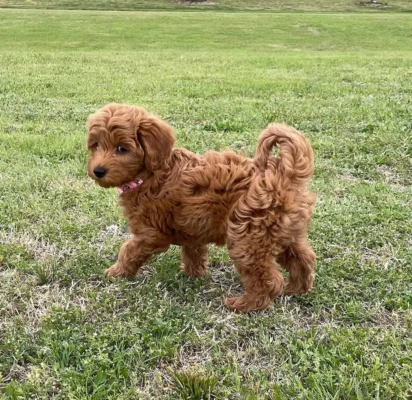 Professional grooming every 6–8 weeks, costing $50–$100 globally, ensures a neat, odor-free coat by trimming matted areas, cleaning ears, and clipping nails. Groomers can also express anal glands if needed, tackling a potential odor source. Owners who find their Cavapoo fidgety during grooming can desensitize them as puppies, starting with short sessions and rewarding calm behavior with treats. Weekly ear cleaning with a vet-approved solution prevents infections, while daily teeth brushing or dental chews combats bad breath, ensuring a comprehensive approach to keeping Cavapoos fresh and odor-free.
Professional grooming every 6–8 weeks, costing $50–$100 globally, ensures a neat, odor-free coat by trimming matted areas, cleaning ears, and clipping nails. Groomers can also express anal glands if needed, tackling a potential odor source. Owners who find their Cavapoo fidgety during grooming can desensitize them as puppies, starting with short sessions and rewarding calm behavior with treats. Weekly ear cleaning with a vet-approved solution prevents infections, while daily teeth brushing or dental chews combats bad breath, ensuring a comprehensive approach to keeping Cavapoos fresh and odor-free.
Diet and Lifestyle: Promoting a Fresh Cavapoo
A Cavapoo’s diet and lifestyle significantly impact whether they have a smell, offering a proactive way to address “Do Cavapoos have a smell?” A high-quality, protein-rich dog food for small breeds, free from fillers or artificial additives, supports healthy digestion and skin, reducing flatulence or oily coat odors. Foods with omega-3 fatty acids, like salmon or flaxseed, promote a glossy coat and minimize skin issues that contribute to smells. Owners often notice their Cavapoo smells fresher after switching to premium kibble or a vet-recommended diet, a change that also boosts energy and vitality. Providing fresh water at all times aids digestion and prevents dehydration, which can exacerbate skin odors.
Food allergies, such as to grains or poultry, can cause skin issues or excessive oil production, leading to a yeasty smell that prompts the question, “Do Cavapoos have a smell?” Veterinary consultation, often through elimination diets, identifies allergens, allowing owners to switch to hypoallergenic formulas that resolve these odors. Feeding 1–1.5 cups daily, split into two meals, prevents overfeeding, which can lead to obesity and stronger body odors. Limiting treats and avoiding human foods like garlic or onions, which worsen breath, further supports a fresh-smelling Cavapoo.
Regular exercise—30–60 minutes daily through walks, play, or training—keeps Cavapoos fit and reduces stress, which can indirectly contribute to skin or digestive issues. Outdoor activities, like exploring a Melbourne beach or a Parisian trail, are enriching but require post-play cleaning to remove dirt or moisture. Weekly cleaning of bedding, toys, and collars prevents odor buildup in the home, ensuring the Cavapoo’s environment remains fresh. These lifestyle choices create a holistic approach to odor prevention, enhancing the Cavapoo’s well-being and answering “Do Cavapoos have a smell?” with confidence.
Managing Environmental and Behavioral Odor Triggers
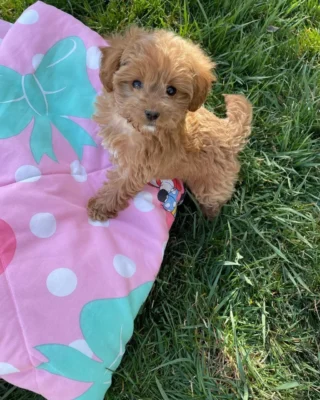
Environmental and behavioral factors can introduce odors to a Cavapoo’s coat, requiring vigilance to keep them fresh. Cavapoos’ curious nature may lead them to roll in grass, mud, or other substances during walks, whether in a Seoul park or a Scottish meadow, leaving a lingering smell if not addressed. Rinsing or wiping their coat with pet-safe wipes after outings prevents these odors from setting in, a simple step that answers “Do Cavapoos have a smell?” with proactive care. Wet fur, if not dried thoroughly after baths or rain, fosters mildew-like smells, particularly in dense coats. Owners should towel-dry or use a low-heat blow dryer, ensuring the undercoat is dry, especially in cooler climates like Oslo.
Indoor environments, such as homes with strong cooking odors, smoke, or pet dander, can cling to a Cavapoo’s coat, mimicking a body smell. Regular vacuuming, air purifiers, and washing pet bedding in hot water minimize these effects, keeping the Cavapoo fresh. Collars or harnesses, if not cleaned monthly, trap oils and dirt, contributing to localized odors. Behavioral habits, like excessive licking or chewing due to boredom or anxiety, can introduce saliva odors or skin irritation, addressed through mental stimulation with puzzle toys or training games. By managing these triggers, owners can ensure their Cavapoo remains odor-free, regardless of their living environment.
FAQs About Do Cavapoos Have a Smell
1. Do Cavapoos naturally have a doggy smell?
Cavapoos have a mild, neutral scent due to their low-shedding coat, unlike oily-coated breeds. Consistent grooming and a healthy diet ensure they stay fresh, addressing concerns about whether Cavapoos have a smell.
2. Why does my Cavapoo smell bad even after bathing?
Bad odors post-bath may stem from ear infections, dental disease, or skin issues. Thorough drying, veterinary checkups, and proper grooming resolve these, answering “Do Cavapoos have a smell?” with targeted care.
3. Can poor grooming cause Cavapoos to have a smell?
Neglecting daily brushing or bathing allows dirt and oils to accumulate, leading to musty odors. Regular grooming every 4–6 weeks prevents this, ensuring Cavapoos don’t have a smell.
4. Do Cavapoos’ ears contribute to their smell?
Floppy ears can trap moisture, causing infections with a pungent odor. Weekly cleaning with a vet-approved solution keeps ears fresh, addressing “Do Cavapoos have a smell?” effectively.
5. Can a Cavapoo’s diet affect whether they have a smell?
Low-quality foods or allergies cause flatulence or skin odors. A protein-rich, omega-3-supplemented diet minimizes smells, supporting owners asking, “Do Cavapoos have a smell?”
6. How often should I bathe my Cavapoo to prevent odors?
Bathe every 4–6 weeks with a gentle shampoo, rinsing and drying thoroughly. This schedule prevents odors, answering “Do Cavapoos have a smell?” with a clean coat.
7. Do Cavapoos have a smell in humid environments?
Humidity can trap moisture in their coat, fostering odors if not dried properly. Daily brushing and thorough drying after baths keep Cavapoos odor-free, addressing odor concerns.
8. Can dental issues make Cavapoos have a smell?
Dental disease causes bad breath, often mistaken for body odor. Daily brushing and annual veterinary cleanings prevent this, ensuring Cavapoos don’t have a smell.
9. How do I keep my Cavapoo’s coat fresh after outdoor activities?
Rinse or wipe their coat with pet-safe wipes after walks to remove dirt, preventing odors and answering “Do Cavapoos have a smell?” with proactive care.
10. Where can I find a healthy Cavapoo to avoid odor issues?
Reputable breeders with health clearances or shelters with socialized dogs offer Cavapoos less prone to health-related odors, supported by proper care to prevent smells.
Conclusion: Do Cavapoos Have a Smell?
In addressing “Do Cavapoos have a smell?”, this guide reveals that Cavapoos have a mild, neutral scent under optimal conditions, thanks to their low-shedding, hypoallergenic coat, which lacks the strong “doggy smell” of some breeds. Odors may arise from inadequate grooming, health issues like dental disease or ear infections, poor diet, or environmental factors like wet fur.
By committing to daily brushing, bathing every 4–6 weeks, and professional grooming every 6–8 weeks, owners can keep their Cavapoo’s coat fresh. A high-quality diet, regular veterinary care, and a clean environment further ensure an odor-free pup, answering “Do Cavapoos have a smell?” with confidence. With these strategies, your Cavapoo will remain a delightful, fresh companion for 12–15 years, bringing joy to homes worldwide, from vibrant cities to tranquil countryside retreats.
